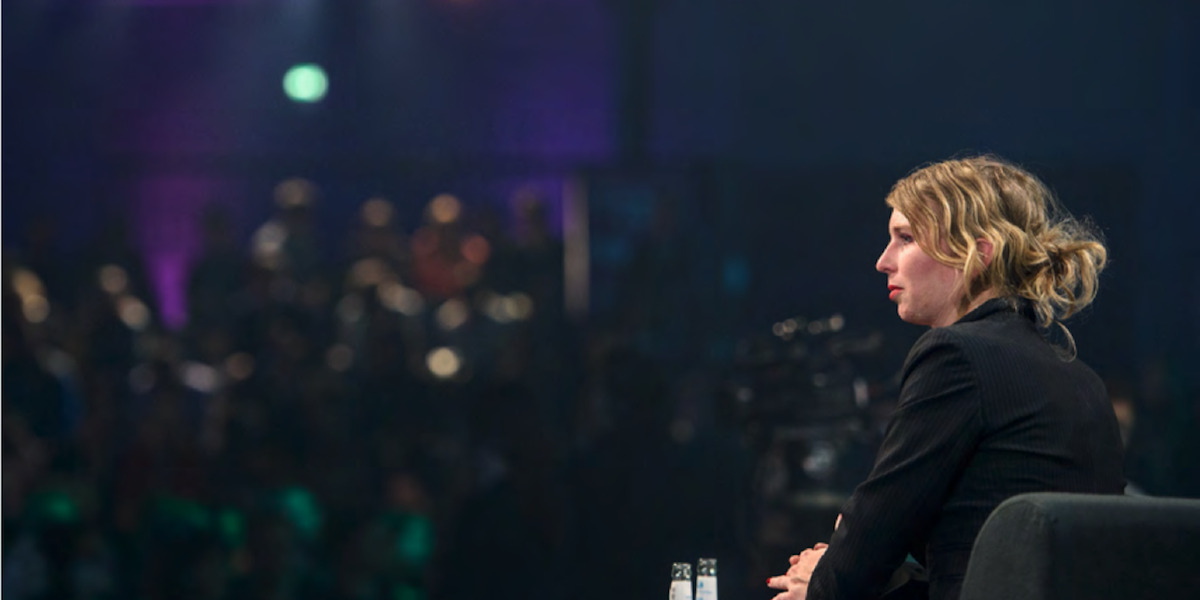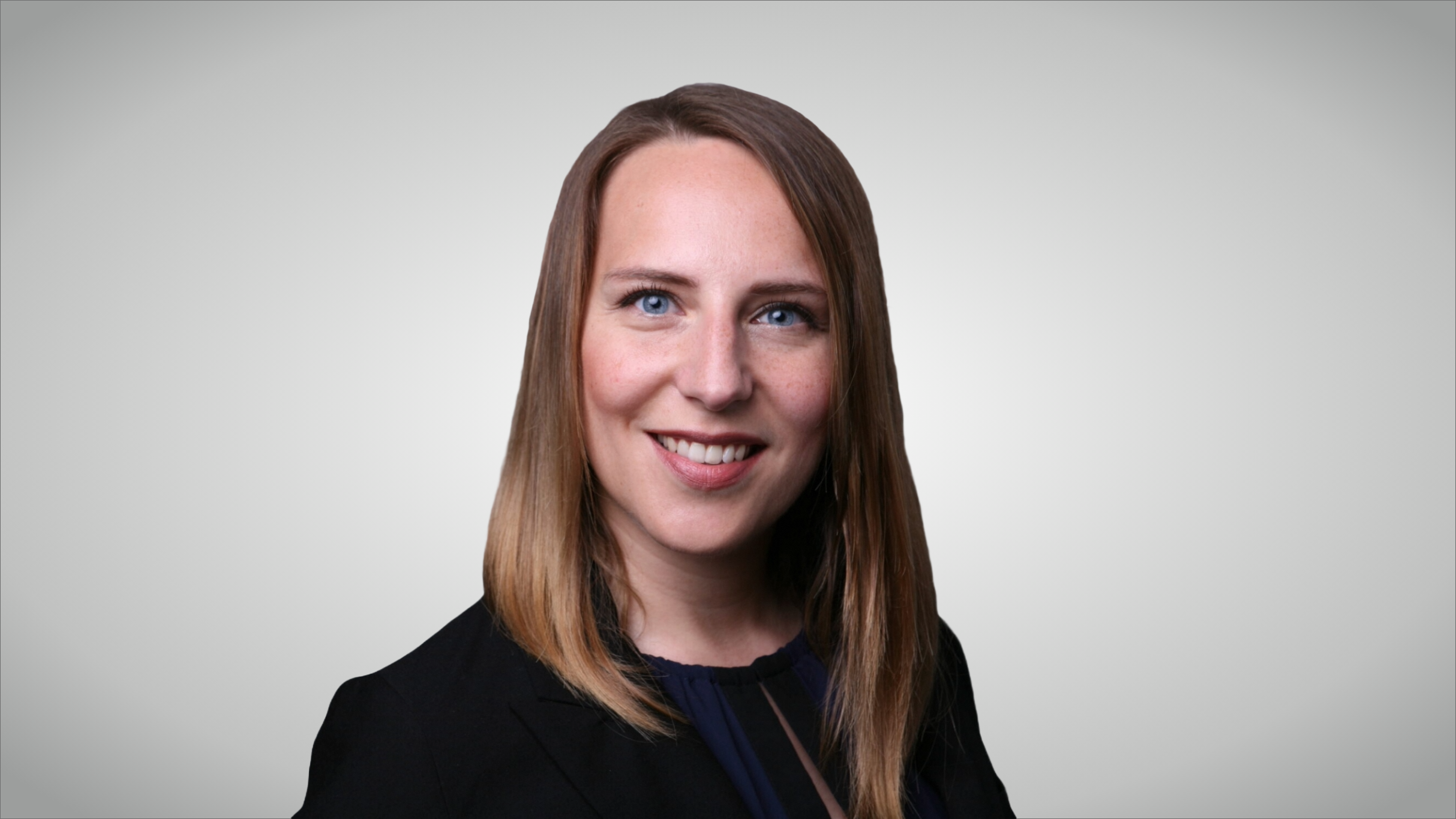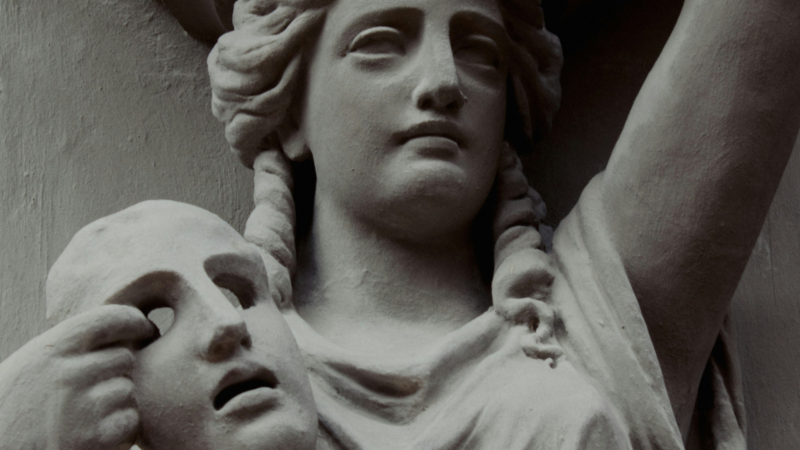Making sense of our connected world

Talk with Chelsea Manning on tech and society
In May 2018, Theresa Züger, who wrote her PhD thesis about digital forms of civil disobedience at Alexander von Humboldt Institute for Internet and Society, had the chance to speak to Chelsea Manning in an interview as an opening session to re:publica alongside Geraldine de Bastion, an expert on communication and information technology. This visit to Berlin was Chelsea Manning’s first trip to Europe after her release from prison. The whole conversation was moving to everyone in the room, not only because of the political brisance. It was a very special moment in the net society’s history due to Chelsea Manning’s visionary and thoughtful analysis about technology in our times and her inspiring and humble personality.
What Chelsea Manning made clear is that the problems we are facing – such as biases in algorithms – are not technical problems, but rather human ones. In reality, this conversation about technology turned out to be more of a conversation about politics than anything:
Theresa Züger: [In her keynote] danah boyd was pointing to a huge problem with prejudices in society. Aside from biases in algorithms – how do we change diversity in our heads? How do we get to a different kind of thinking? Because I think what she pointed out is that this is actually where we have to look first.
Chelsea Manning: Humans are like a machine learning algorithm, in our day to day lives we’re doing the same thing that a machine learning algorithm is doing, because we’re learning, so we learn biases and prejudices, not necessarily consciously, but we have to take a step back and become more self-aware of our 12 position, our probe, our privilege, our position in society and we also have to listen to what other people say who aren’t us. We should be listening to people of color or immigrants. We should be listening to what their experiences are and what they’re telling us because we don’t have that experience. We have these biases built into our systems that we have learned, and we have to unlearn those – and that’s not going to happen by continuing to go about business as usual. People have the ability to learn, and when we don’t do this, we end up worse off in society.
Züger: From what you’re saying right now, I feel that dissent is a very important idea in your political thinking and I wondered.
Manning: It’s the primary idea of my political thinking!
Züger: […] and I wondered where you think the limit of what is debatable in democracy is or where you would stop talking?
Manning: Well, you can’t have a debate with somebody who is calling for genocide or ethnic cleansing […]. I don’t necessarily think that handing every single white supremacist a microphone, like we do in America, is a good idea. I don’t think that’s a requirement. I mean, it’s not free speech, it’s hate speech. I don’t think free speech means that you hand anybody who has an opinion a microphone.
Züger: I read in an interview that your actions against the wrongdoing of the American government were the result of certain values that are very important to you and, since I wrote a PhD about civil disobedience, I wanted to talk about what those values are?
Manning: I value people, I value my friends, I value my family, I value people that I don’t know that have similar experiences, I value people, whose experiences or what they go through I don’t have any knowledge of. I see humanity as having an inherent value that drives me, that drives every moment of my day. I’m not a perfect person, but I try my best to live by these values because that’s the way I’ve felt deep inside since I was a kid. We are all connected. I feel like all of us have a connection to each other, and that connection [exists] especially in a society like ours where everything is so connected. We’re connected to people we don’t know in far-off places. Even mathematically, we do have about six degrees of separation with virtually every single person in the world, so really, we don’t have a large world. There’s this great photograph taken from Voyager One, the space probe, it’s called the pale blue dot. Carl Sagan had a great poem that makes me have a moment every time I read it – and I read it every so often. We’re on this tiny speck, this tiny little dot, and we – with all of our hate and all of our prejudices, and all of our frustrations – just seem so paltry and so measly on the scale of planets, on the scale of stars, and the scale of galaxies. We really only have each other, and we are dependent upon each other in a very limited ecosystem and in a world that is fragile and in a society that is fragile, and we have to recognise our role in that – each and every one of us and do the best that we can with what we have.
Geraldine de Bastion: It’s very beautifully said – not just very beautiful, but also very humble. Which is something not all humans are good at, sadly. Is this something that you’ve always carried within you?
Manning: I’m not special or anything. As a teenager, I could sometimes be arrogant and I thought I knew everything, but my experience of the last decade has taught me that no matter how much experience I get in life and no matter how much I read, no matter how much I learned, it feels like I actually know less. I am less important the more that I’ve lived my life because I realised that the things that matter most are the connections that we have and not what we’ve learned or what I experience and that has been a humbling experience the last decade of my life gave me. Going into the military, being homeless before that, and going to war and then going to prison, […] I’ve seen and I’ve learned things that I’m going to take away and do better because I’ve had these experiences for the rest of my life. I was driven to do good before but now my values crystallised. It solidified my dedication to just living the best life and doing every single thing that I can to make the world better – just as a person. Not as a famous person, or a political figure, or as a public figure – just as me as an individual.
Züger: But I do believe that, for a lot of people, you really became a bridge figure to political thinking with what you did. Your actions showed what one person can change. I wonder, how can you and we encourage more people to have that bravery to believe that they can change something in society?
Manning: I wasn’t able to speak for seven years. I was able to write a little bit and I had a Twitter account eventually, but I worried because I got thrust into being a public figure all of a sudden. I’ve never been a public figure before. When I was in prison, I wasn’t a public figure in my day-to-day life. I was a prisoner, so I just worry that I’m an imperfect person. There has been a kind of cult of personality that is really intimidating and that is overwhelming for me, and I’m still trying to adjust to life after prison while also being a public figure at the same time. I’ve been struggling to balance that. […] I’m still in recovery, I still need to take time to figure this out and this is hard!
de Bastion: How are you managing that? Because, I mean, that makes so much sense and at the same time you’re speaking out on so many important topics. It’s not just that you’re focused on technological issues or prison issues and immigration issues, you’ve sort of embraced everything that is important to you and that you feel isn’t just. That must also be a lot!
Manning: Yes, the things that drove me ten years ago, the things I was concerned about like the militarisation of police, the use of mass surveillance, the adoption of algorithms in governmental and corporate decisions that impact our daily lives, have only accelerated and increased in power and increased in the entrenchment that they have, and we see that every single major systemic problem has been made worse and is becoming worse. We can’t wait. The time for talking about reform was 40 years ago. We can’t talk about reform anymore. We can’t talk about hoping for change and tweaking something here and there to change things that’s why I’m out here. It’s because we don’t have the time to figure it out, build minor tweaks. This is a systemic acceleration towards authoritarianism across-the-board worldwide. We have to do everything we can right now to stop it and because we can’t ask it to stop, we can’t nudge it to stop, we have to make it stop!
Züger: Since this is my last question, there’s really one that interested me. Your act of whistleblowing changed your life completely, but has it changed you as a person? What has stayed the same with you?
Manning: I mean, everything is the same. I’m the same person you know. I’m stronger and I’m older, and I’m more experienced but the same I was ten years ago […]. When you are with other people [in prison] that have also been stripped away of everything, you realise – that this is what matters. This is who we are. It’s not what suit or clothes you wear, it’s not what you do, it’s not where your job is, or your title. It is who you are when you’ve lost everything. How much integrity you have as a human being when you’ve lost it all. [In prison] we had that, we found that together as a group because we needed each other in an environment where any one of us could be messed with by a guard at any moment. We couldn’t look the other way and let that happen because it could happen to one of us, so we would band together and depend on each other for mutual aid and mutual comfort in these tough moments. I learned that this is what humanity is at its base. The strongest part of us is the ability – even in the most intense and the most extreme circumstances – to band together and fight back and to get through it and survive.
Chelsea Manning became a public figure as a whistleblower in 2010. She was an IT specialist for the US Army in Iraq, when she decided to make classified information – such as footage of civilian deaths by US Forces – available to the public. She was sentenced to 35 years in prison for this act of whistleblowing but was released by President Obama in 2017.
This post represents the view of the author and does not necessarily represent the view of the institute itself. For more information about the topics of these articles and associated research projects, please contact info@hiig.de.

You will receive our latest blog articles once a month in a newsletter.
Research issues in focus
Online echoes: the Tagesschau in Einfacher Sprache
How is the Tagesschau in Einfacher Sprache perceived? This analysis of Reddit comments reveals how the new simplified format news is discussed online.
Opportunities to combat loneliness: How care facilities are connecting neighborhoods
Can digital tools help combat loneliness in old age? Care facilities are rethinking their role as inclusive, connected places in the community.
Unwillingly naked: How deepfake pornography intensifies sexualised violence against women
Deepfake pornography uses AI to create fake nude images without consent, primarily targeting women. Learn how it amplifies inequality and what must change.




